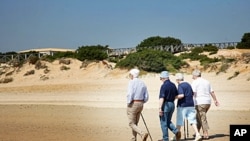Creatures tends to slow down as they near death. But doctors don’t use this knowledge as a way of evaluating what’s happening to their patients as they age. Stephanie Studenski, a geriatrician who specializes in the care of older people, wants to change that by finding a way to measure diminishing walking speed.
Studenski compares assessing how fast a person walks to weighing a patient. Doctors can look at their patients and see if they’ve gained or lost weight but they also put them on a scale. Why not do the same with gait?
"If we all already know it, and it's throughout science and its throughout experience, why are we not using it in health care? Why are we not using it in public health?" she asks. "Why don't people have this as part of their understanding as an indicator of health? And the reason I think it's not there is that there hasn't been any way to measure it."
Many long-term research studies of older people have collected data on how fast subjects walk. Studenski contacted the leaders of these studies and got them to give her their data about walking speed, the general health of subjects and their longevity. She collated information about nearly 35,000 people, including their ages, their walking speed and how long they lived. She found that information about walking speed was particularly useful to predict the lifespan for people older than 75.
"There is so much variability between people as they age, more than in any other point in life, once life experience and health and nutrition have influenced how our health is later in life," Studenski says. "And so older people are very different from each other. And so this allows us more individualized our understanding of what might lie ahead at age 70, 75, 80, 85."
Studenski has developed charts that people can use to look up their probability of being alive five or 10 years later according to their age, gender and walking speed. She says clinicians could use the charts to assess patients on a regular basis and track their progress.
"So we can sort of individualize our approach to healthcare planning, to medical management, perhaps to wellness planning more than just by age and gender."
Unfortunately, Studenski says there’s no evidence that people who work on improving their walking speed necessarily can extend their lives. But she does say more attention to walking speed can help doctors and families recognize if something’s wrong with a loved one sooner and take steps to get help.
Studenski’s research is published in the Journal of the American Medical Association.




